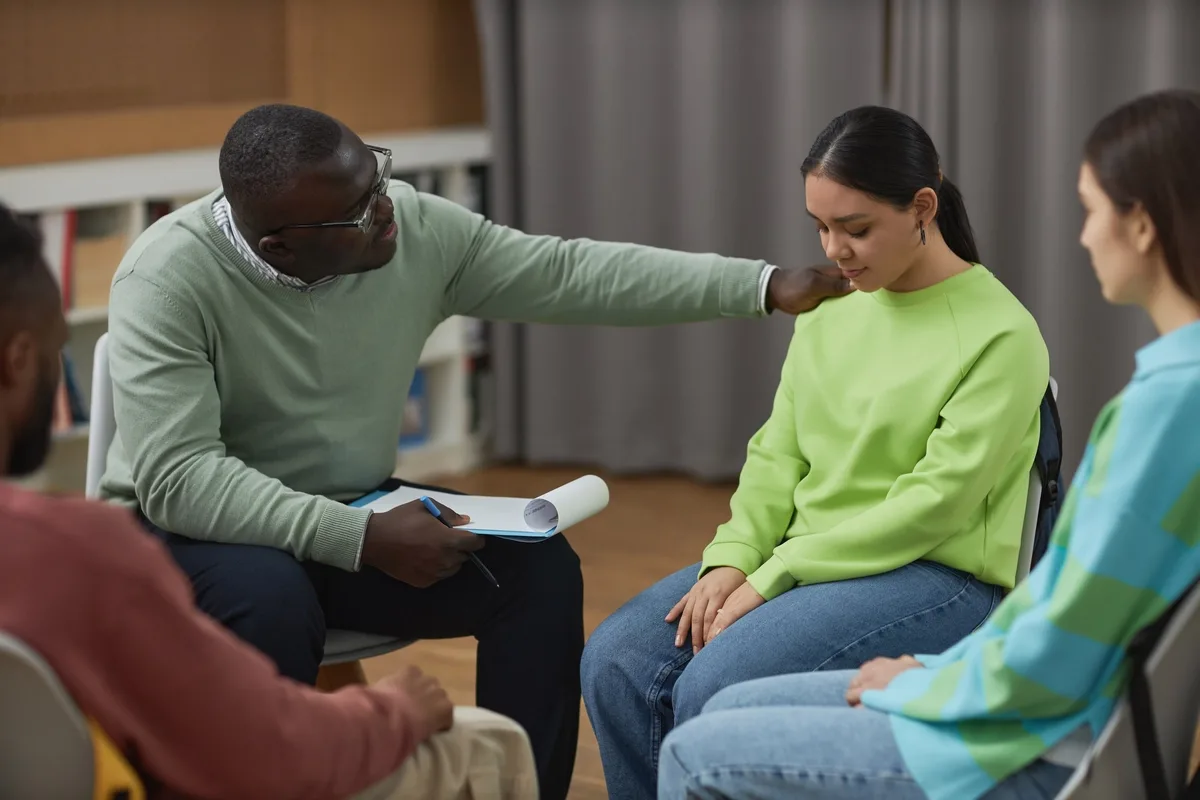24/7 Helpline:
(866) 899-221924/7 Helpline:
(866) 899-2219
Learn more about Residential Rehab centers in Webster County

Other Insurance Options

PHCS Network

Ambetter

Providence

Aetna

Optima

MVP Healthcare

Oxford

Cigna

Covered California

Health Partners

UMR

WellCare Health Plans

American Behavioral

GEHA

Absolute Total Care

Premera

Kaiser Permanente

Health Choice

Anthem

BlueCross

Community & Family Resources – Fort Dodge
Community & Family Resources (CFR) Fort Dodge is an accredited dual diagnosis mental health and addi...

Community & Family Resources
Community & Family Resources provides treatment of substance abuse, problem gambling, and mental ill...

YWCA of Fort Dodge – Center for Life Empowerment
YWCA of Fort Dodge - Center for Life Empowerment is a non profit rehab located in Fort Dodge, IA. YW...

Children and Families
Children and Families is a private rehab located in Fort Dodge, Iowa. Children and Families speciali...

Transitions
Transitions offers comprehensive substance use disorder treatment. The mission of Transitions is to ...

Ten16 Recovery Network
Ten Sixteen Recovery Network is a nonprofit rehab located in Clare, Michigan. Ten Sixteen Recovery N...

Ohio River Valley Halfway House
Ohio River Valley Halfway House is a private rehab located in Dayton, Ohio. Ohio River Valley Halfwa...

Family Service Association – Dayton
Family Service Association – Dayton is a private rehab located in Dayton, Ohio. Family Service Assoc...

Goodwill Easter Seals Miami Valley
Goodwill Easter Seals Miami Valley is a private rehab located in Dayton, Ohio. Goodwill Easter Seals...

Kettering Behavioral Medicine Center
Kettering Behavioral Medicine Center is a faith based mental health treatment center located in Dayt...

Public Health – Dayton and Montgomery County’s Addiction Services
Public Health - Dayton and Montgomery County's Addiction Services is located in Dayton, Ohio. Public...

Haven Behavioral Hospital
Haven Behavioral Hospital is a private rehab located in Dayton, Ohio. Haven Behavioral Hospital spec...

Nova Behavioral Health
Nova Behavioral Health is located in Dayton, Ohio. Nova Behavioral Health offers a continuum of alco...

ADAMHS of Montgomery County
ADAMHS of Montgomery County is a non-profit rehab located in Dayton , OH. ADAMHS of Montgomery Count...

Wellness Card
Wellness Card is a private rehab located in Dayton, Ohio. Wellness Card specializes in the treatment...

Samaritan Behavioral Health
Samaritan Behavioral Health is a private rehab located in Dayton, Ohio. Samaritan Behavioral Health ...

South Community
South Community is a private rehab located in Dayton, Ohio. South Community specializes in the treat...

Eastway Behavioral Healthcare
Eastway Behavioral Healthcare is the largest, not-for-profit provider of mental health services in t...

Eastway – Webster Street Academy and Family Center
Eastway - Webster Street Academy and Family Center provides a unique holistic approach to serve the ...

ViaQuest Psychiatric and Behavioral Solutions
ViaQuest Psychiatric and Behavioral Solutions is a private rehab located in Dayton, Ohio. ViaQuest P...

Project CURE
Vision Statement: Project C.U.R.E. Inc. is a unique agency that is the leading provider of quality s...

Beckett Springs Changes
Changes is a partial-day mental health and addiction treatment alternative for adults and adolescent...

Project CURE – Daruma Parkway
Project CURE – Daruma Parkway is a private rehab located in Dayton, Ohio. Project CURE – Daruma Park...

Wright State University – Substance Abuse Resource
Wright State University – Substance Abuse Resource is a private rehab located in Dayton, Ohio. Wrigh...

Miami Valley Recovery
Miami Valley Recovery is a private rehab located in Dayton, Ohio. Miami Valley Recovery specializes ...

Brightview – Dayton Addiction Treatment Center
The Brightview Dayton Addiction Treatment Center is an accredited substance abuse treatment rehab in...

CSSL Mental Health & Addiction Treatment Services
Professional, compassion treatment you deserve and need for Mental Health, Dual Diagnosis, Detoxific...

MedMark Treatment Centers
MedMark Treatment Centers in Dayton, Ohio, offer specialized outpatient care for individuals battlin...

Spero Health – Dayton
Spero Health – Dayton is a private rehab located in Dayton, Ohio. Spero Health – Dayton specializes ...

National Youth Advocate Program – Dayton
National Youth Advocate Program (NYAP) is committed to the well-being of those we serve and provide ...

TCN Behavioral Health Services
TCN Behavioral Health Services is a non-profit organization that offers a wide variety of behavioral...

Eastway Behavioral Healthcare – Housing Services
Eastway Behavioral Healthcare – Housing Services is an accredited behavioral health treatment center...

Pinnacle – Dayton Treatment Services
Pinnacle - Dayton Treatment Services provides treatment for the abuse of alcohol, opioids, and other...

Woodhaven
Woodhaven is a drug and alcohol residential treatment center located in Dayton, Ohio. They provide a...

Volunteer Behavioral Health – Rhea Mental Health Center
Volunteer Behavioral Health - Rhea Mental Health Center is located in Dayton, Tennessee. Volunteer B...































Community & Family Resources – STARS Adolescent Program
Community and Family Resources - STARS Adolescent Program is a non-profit rehab located in Fort Dodg...

Trinity Recovery Center
Trinity Recovery Center is a private rehab located in Fort Dodge, Iowa. Trinity Recovery Center spec...

Hope Haven – Fort Dodge
Hope Haven – Fort Dodge is a private rehab located in Fort Dodge, Iowa. Hope Haven – Fort Dodge spec...

K Moore Services
K Moore Services is a private rehab located in Fort Dodge, Iowa. K Moore Services specializes in the...

New Perspective Treatment Services
New Perspective Treatment Services is an outpatient substance abuse treatment. Services include alco...

AA – Alcoholics Anonymous
AA – Alcoholics Anonymous is a non-profit rehab located in Fort Dodge, Iowa. AA – Alcoholics Anonymo...

Face Truth and Clarity on Alcohol
Face Truth and Clarity on Alcohol is a private rehab located in Clare, Michigan. Face Truth and Clar...

Rural Nevada Counseling
Rural Nevada Counseling - Pike Street offers outpatient treatment for individuals with alcohol and/o...

Greene Hall
Greene Hall is a private rehab located in Dayton, Ohio. Greene Hall specializes in the treatment of ...

National Youth Advocate Program
National Youth Advocate Program is a drug and alcohol rehab located in Dayton, OH. They provide outp...

Addiction and Psychotherapy Services
Addiction and Psychotherapy Services is a private rehab located in Dayton, Ohio. Addiction and Psych...

DayMont Behavioral Healthcare – Sojourner Program
DayMont Behavioral Healthcare – Sojourner Program is a private rehab located in Dayton, Ohio. DayMon...

Nova Behavioral Health – MorningStar
Nova Behavioral Health - MorningStar is located in Dayton, Ohio. The Nova Behavioral Health - Mornin...

OK Corral
OK Corral is a private rehab located in Dayton, Ohio. OK Corral specializes in the treatment of dual...

AA – Alcoholics Anonymous – West 2nd Street
AA – Alcoholics Anonymous – West 2nd Street is a non-profit rehab located in Dayton, Ohio. AA – Alco...

Combined Health Center for Alcoholism and Drug Addiction
Combined Health Center for Alcoholism and Drug Addiction offers outpatient treatment for individuals...

Evergreen Counseling Associates
Evergreen Counseling Associates is an outpatient rehab located in Dayton, OH. Evergreen Counseling A...

Consumer Advocacy Model
Consumer Advocacy Model is a private rehab located in Dayton, Ohio. Consumer Advocacy Model speciali...

Integrated Youth Services
Integrated Youth Services is a private rehab located in Dayton, Ohio. Integrated Youth Services spec...

Mahajan Therapeutics
Mahajan Therapeutics is an accredited substance abuse and co-occurring disorder treatment center in ...

Goris Counseling and Consulting
Goris Counseling and Consulting is a public rehab located in Dayton, Ohio. Goris Counseling and Cons...

Duke Ellis Human Development
Duke Ellis Human Development is a public rehab located in Dayton, Ohio. Duke Ellis Human Development...

Day Mont Behavioral Health Care – Xenia Avenue
Day-Mont Behavioral Health Care - Xenia Avenue provides treatment that focuses on the integration of...

Day Mont Behavioral Health Care – Focus Care
Day-Mont Behavioral Health Care - Focus Care provides treatment that focuses on the integration of p...

Blue Mountain Counseling of Columbia County
Blue Mountain Counseling of Columbia County is a private rehab located in Dayton, Washington. Blue M...




































































































































































